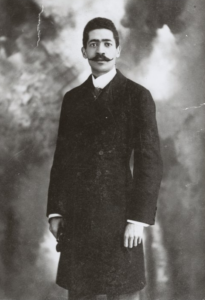Will Marion Cook
(1869–1944), the famed early 20th Century composer, violinist and choral
director, was one of the most important figures in pre-jazz African-American music. The 15-year-old’s astonishing playing as a student at Oberlin College caught the attention of Frederick Douglass, who helped organize a fundraiser to send him to Europe to study at the Berlin Hochschule für Musik with Joseph Joachim, the famed violinist and associate of Brahms. Cook’s earliest composition, Scenes from the Opera of Uncle Tom’s Cabin, intended for the Chicago World’s Fair of 1893, was never performed. In 1894-95 he continued his studies at the National Conservatory with Antonin Dvořák and John White.
But finding few opportunities to perform in public and no teaching position, he set aside his violin and turned to the musical theater, where he was destined to create ground-breaking Broadway shows that used folk elements in an original and distinct manner and showcased many gifted black performers. Clorindy, or The Origin of the Cake Walk (1898), a one-act musical comedy created in collaboration with poet Paul Laurence Dunbar, was the first all-black show to play at a prestigious Broadway house: the Roof Garden of the Casino Theatre.
There were only 50 people in the rooftop audience that night, but when theater-goers exiting the main show downstairs heard magnificent choral singing coming from the roof, they rushed up to see who was performing. By the end of the opening chorus, the house was packed and the performers given a 10-minute ovation.

Cook’s Clorindy was the first all-Black show to play at a prestigious Broadway house. (wikipedia.org)
In Dahomey (1903), again with lyrics by Dunbar, would be the first full-length musical written and played by blacks performed at a major Broadway house. Generally considered Cook’s strongest work, it satirically addressed elements of African-American and US history, jettisoning the stereotypes of the day. A four-year tour would follow. The trailblazing show was warmly received in the United Kingdom, in cities across the U.S. Cook would remain an important figure in the new century, writing and publishing many songs, and winning fame as a conductor. He was musical director for Bert Williams and George Walker’s string of groundbreaking musicals, including The Sons of Ham (1900), Abyssinia (1906) and Bandana Land (1908), and wrote music for The Southerners (1904), the first Broadway show to feature a racially integrated cast.
Cook also organized many choral societies in both New York City and in Washington, D.C. Many of his musical theater pieces were scored for chorus. In 1912, G. Schirmer issued Three Negro Songs: For Chorus of Men’s Voices with Piano Accompaniment. The collection included Rain Song, Exhortation, and Swing Along!, which were exceedingly popular with community choirs during the first part of the 20th century. (Performances of these three songs, as well as selections from In Dahomey and Clorindy , a riveting strut number for piano, “Darktown Is Out Tonight” (1898), and at least two of Cook’s big ragtime hits, “On Emancipation Day”(1902) and “Cruel Pap” (1914), can be heard on Youtube. Google on “will marion cook youtube” to experience these and more.)
A historic concert that May at Carnegie Hall featured Cook’s 150-voice chorus in a performance of Swing Along! In 1918, he founded the New York Syncopated Orchestra, later renamed the Southern Syncopated Orchestra. Augmented by a 20-voice choir, it toured the United States and Europe until 1920. As mentor and teacher, Cook influenced a generation of young African-American musicians, including jazz composer/performer Duke Ellington and singer Eva Jessye, the first black woman to become a professional choral conductor.
Thomas Riis, in his study of early black musical theater, singles out Cook’s remarkable harmonic skill and compositional sophistication, which he believes helped pave the way for the marriage of popular spirit and classical complexity that became jazz. Cleveland avidly followed Will Cook’s amazing career for years.
Cleveland Jazz historian Joe Mosbrook adds: “Cook introduced the saxophone to popular music, was the first trained composer to incorporate ragtime into ‘serious music,’ influenced W.C. Handy, and was an early teacher of and strong influence on Duke Ellington. Ellington later said, ‘Some of the things he told me I never got a chance to use until years later.’” Cleveland State University history professor Karen Sotiropoulos, an authority on African American theater & musicals of the early 20th century, writes extensively about Cook, whom she considers major figure, in her critically hailed book Black Performers in Turn of Century America (Harvard University Press, 2006)